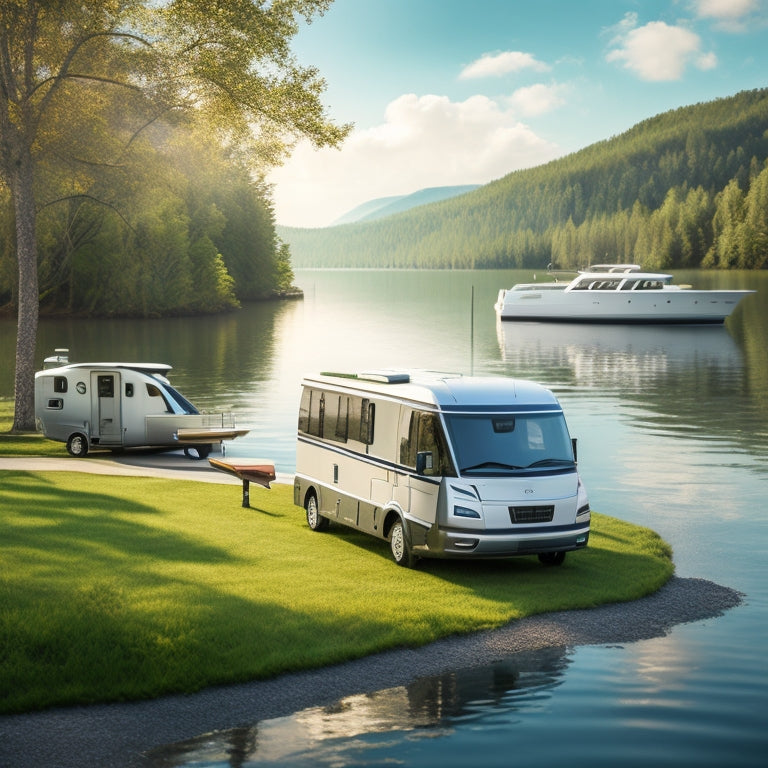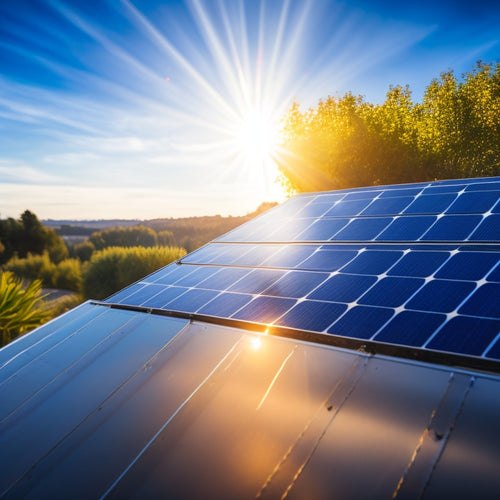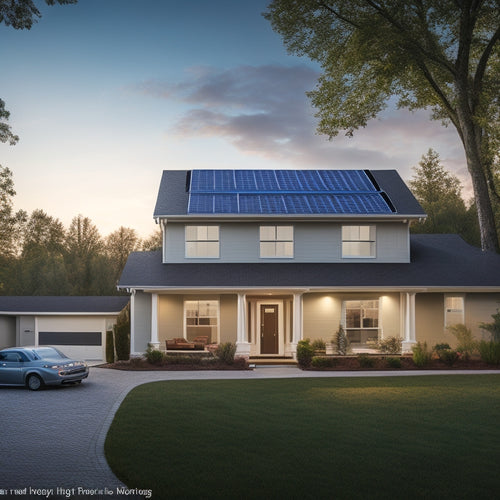
10 Essential Energy Storage Tips for RVs and Boats
Share
When it comes to powering your RV or boat, a well-planned energy storage system is essential. You'll want to start by evaluating your energy needs, considering factors like daily consumption, usage patterns, and backup time. Then, choose the right deep cycle batteries, selecting the correct chemistry for your needs. Don't forget to monitor your battery state, avoid over or undercharging, and plan for backup power needs. Investing in quality inverters and regularly checking battery health are also essential. By following these essential energy storage tips, you'll be well on your way to maximizing your off-grid adventures - and there's more to discover when you take the next step.
Key Takeaways
• Calculate total daily energy consumption to determine the right battery size and type for your RV or boat's energy needs.
• Choose the right battery chemistry (flooded, AGM, or Lithium-Ion) based on power requirements, budget, and usage patterns.
• Monitor battery state of charge, voltage, and temperature to prevent deep discharging, overcharging, and undercharging.
• Select a high-efficiency inverter with pure sine wave output to ensure reliable power conversion for sensitive electronics.
• Regularly test and maintain your backup power system to ensure it's ready when you need it during power outages.
Assess Your Energy Needs First
Before investing in an energy storage system for your RV or boat, determine how much power you need by calculating your total daily energy consumption in ampere-hours (Ah) or watt-hours (Wh). This essential step guarantees you get an energy storage system that meets your specific needs.
Conducting an energy audit helps you identify areas of energy inefficiency and opportunities for improvement. You'll need to calculate the load of each appliance, including lights, refrigerators, and air conditioners, to determine their individual energy demands. Add up the total energy consumption to get an accurate picture of your daily energy needs.
Load calculation involves considering factors like the type and number of appliances, their usage patterns, and the desired backup time. By doing so, you'll be able to specify the required energy storage capacity, voltage, and type of batteries suitable for your RV or boat.
This thorough assessment will ensure your energy storage system is tailored to your unique needs, providing reliable power and excellent performance.
Choose Deep Cycle Batteries
When it comes to choosing the right batteries for your RV or boat, you'll want to opt for deep cycle batteries specifically designed for energy storage.
These batteries are built to handle the unique demands of off-grid power systems, providing a reliable source of energy when you need it most.
Battery Type Matters
You'll get the most out of your RV or boat's energy storage system by selecting batteries designed specifically for deep cycling, which can handle the repeated charge and discharge cycles demanded by these applications. This is particularly vital in marine applications, where Cold Cranking batteries are often required to power high-torque engines.
When choosing deep cycle batteries, consider the following key factors:
-
Cold Cranking Amperage (CCA): Make sure the battery can deliver the required cold cranking amps to start your engine.
-
Reserve Capacity (RC): Select a battery with a high RC rating to provide power during extended periods of discharge.
-
Deep Cycle Capability: Look for batteries designed to handle the repeated charge and discharge cycles characteristic of RV and boat applications.
- Maintenance Requirements: Consider batteries with low maintenance requirements, such as AGM or sealed batteries, to minimize upkeep and maximize performance.
Cycle Life Importance
Selecting a battery with a necessary cycle life is vital since it directly impacts the overall performance and longevity of your RV or boat's energy storage system. You want a battery that can withstand the demands of repeated charge and discharge cycles. A deep cycle battery with a high cycle life expectancy is critical for reliable energy storage.
When choosing a battery, look for one with a high cycle count, typically above 500 cycles. This guarantees your battery can handle the frequent charging and discharging that occurs in RV and boat applications. A higher cycle life also translates to longer battery durability, reducing the need for frequent replacements.
Opting for a battery with a longer cycle life expectancy will save you time, money, and hassle in the long run. It's imperative to prioritize battery durability when selecting an energy storage solution for your RV or boat. By doing so, you'll enjoy a more reliable and efficient energy storage system that meets your power needs.
Consider Battery Size Carefully
Your battery bank's overall performance and capacity depend heavily on choosing the right battery size for your RV or boat's specific energy needs. A battery that's too small won't provide enough power, while one that's too large will take up valuable space and increase costs.
When selecting a battery size, consider the following factors:
-
Battery Capacity: Calculate your daily energy requirements and choose a battery with sufficient capacity to meet those needs.
-
Space Constraints: Measure your available storage space to determine the maximum battery size that can fit comfortably.
-
Power Requirements: Consider the maximum power draw of your appliances and make sure your battery can supply that power.
- Expansion Plans: Think about your future energy needs and select a battery size that can accommodate potential upgrades.
Select Right Battery Chemistry
With your battery size determined, it's now important to choose the right battery chemistry to guarantee peak performance and longevity in your RV or boat's energy storage system.
Don't fall prey to Battery Myths - understanding the Chemical Differences between battery types is essential. You'll often come across three main types: Flooded, AGM, and Lithium-Ion.
Flooded batteries are the most affordable, but they require maintenance and have limited cycle life. AGM batteries, on the other hand, offer better performance and longer lifespan, but at a higher cost.
Lithium-Ion batteries are the most advanced, boasting high energy density, long cycle life, and low maintenance, but they come with a premium price tag.
Consider your power requirements, budget, and usage patterns to select the right chemistry for your energy storage system. By doing so, you'll ensure your RV or boat's energy storage system operates efficiently and reliably, giving you peace of mind on the road or water.
Monitor Your Battery State
How can you guarantee that your energy storage system is operating within ideal parameters if you're not keeping tabs on your battery's state of charge, voltage, and temperature? You can't, and that's why monitoring your battery state is essential.
To make sure your system is running smoothly, you need to keep a close eye on your battery's performance. This is where Battery Alert Systems and Remote Monitoring Tools come in. These innovative solutions provide real-time data, enabling you to:
-
Track state of charge: Get accurate readings on your battery's charge level, ensuring you're not pushing it too far.
-
Monitor voltage: Keep an eye on your battery's voltage levels to prevent damage from overcharging or undercharging.
-
Check temperature: Ensure your battery is operating within a safe temperature range to prevent overheating or cooling issues.
- Receive alerts: Set up custom notifications to alert you to any potential issues before they become major problems.
Maintain Proper Battery Care
When it comes to maintaining proper battery care, you'll want to develop a routine that guarantees your batteries are always in top condition.
This starts with regularly checking your charge levels, electrolyte levels, and avoiding deep discharging, which can greatly reduce the lifespan of your batteries.
Monitor Charge Levels
You should regularly check your battery's state of charge to prevent overcharging or undercharging, which can greatly shorten its lifespan. Monitoring charge levels is important to extend the life of your battery and guarantee peak performance.
Here are some essential tips to monitor charge levels effectively:
-
Track Voltage Fluctuations: Keep an eye on voltage readings to detect any unusual fluctuations that may indicate a charging issue.
-
Count Charging Cycles: Keep a record of the number of charging cycles your battery has gone through to estimate its remaining lifespan.
-
Use a Battery Monitor: Invest in a battery monitor that provides real-time data on your battery's state of charge, voltage, and temperature.
- Conduct Regular Checks: Schedule regular checks on your battery's charge level, especially after extended periods of disuse or heavy usage.
Check Electrolyte Levels
Regularly inspecting electrolyte levels is crucial to prevent damage from overfilling or underfilling, as improper electrolyte levels can reduce battery performance and lifespan. You must guarantee the electrolyte levels are within the recommended range to maintain peak battery health.
Here's a general guideline for electrolyte maintenance:
| Electrolyte Level | Action Required |
|---|---|
| Below minimum level | Add distilled water to refill |
| At or above maximum level | Remove excess electrolyte |
| Within recommended range | No action required |
When performing electrolyte maintenance, use distilled water for refills to prevent contamination. Ensure the electrolyte level is at the recommended level, as specified in your battery's manual. Remember to wear protective gear, including gloves and safety glasses, when handling batteries and electrolytes. By following these guidelines, you'll be able to maintain proper electrolyte levels, extending the life and performance of your RV or boat's batteries.
Avoid Deep Discharging
Proper electrolyte levels are just the starting point, as avoiding deep discharging is equally essential to maintaining your RV or boat's battery health. When you allow your batteries to consistently drop below 50% state of charge, you're accelerating battery wear and reducing their overall lifespan.
This is because deep discharging causes voltage drops, which can lead to permanent damage and decreased performance.
To avoid deep discharging, follow these guidelines:
-
Monitor your battery state of charge: Keep a close eye on your battery's state of charge to prevent it from dropping too low.
-
Set a low-voltage alarm: Set an alarm to alert you when your battery voltage drops to a critical level.
-
Charge your batteries regularly: Regular charging helps prevent deep discharging and reduces battery wear.
- Size your battery bank correctly: Make sure your battery bank is adequately sized for your energy needs to prevent excessive discharging.
Avoid Over or Under Charging
Charging your batteries incorrectly can lead to premature wear, reduced capacity, and even complete failure. When you overcharge or undercharge your batteries, you're shortening their lifespan and reducing their overall performance. To avoid this, it is crucial to understand the best charging range for your batteries.
| Charge Level | Effects on Battery | Recommended Action |
|---|---|---|
| 80-100% | Overcharging, reduced lifespan | Monitor charging, disconnect when full |
| 50-79% | Best charging, maximum lifespan | Maintain this range for longest life |
| 20-49% | Undercharging, reduced capacity | Charge regularly to prevent deep discharge |
| 0-19% | Deep discharge, severe damage | Avoid at all costs, charge ASAP |
Plan for Backup Power Needs
By understanding the ideal charging range for your batteries, you can now focus on guaranteeing you have a reliable backup power system in place to support your energy needs when the main power source is unavailable. This is vital in case of power outages or emergency situations, where you may need to rely on your backup power system for extended periods.
To make sure you're prepared, consider the following:
-
Calculate your backup power needs: Determine how much power you'll need to support your essential systems during an outage.
-
Choose the right battery bank: Select a battery bank that can provide sufficient power and has the necessary capacity to support your backup power needs.
-
Select a suitable backup power source: Consider options like generators, solar panels, or wind turbines to provide power when the main source is unavailable.
- Regularly test and maintain your backup system: Ensure your backup power system is functioning correctly and make any necessary adjustments to guarantee reliability.
Invest in Quality Inverters
When it comes to powering your RV or boat's appliances, you need an inverter that can efficiently convert your stored energy into usable power.
A high-quality inverter is important, as it directly affects your system's overall performance and reliability.
Inverter Efficiency Matters
You'll greatly reduce energy waste and optimize your off-grid system's performance by selecting an inverter with a high efficiency rating. A high-efficiency inverter guarantees that most of the energy stored in your batteries is converted into usable power, rather than being wasted as heat. This is vital for RVs and boats, where energy storage is limited and every watt counts.
When selecting an inverter, look for the following key factors to optimize power optimization:
-
Inverter ratings: Check the inverter's continuous power rating and surge capacity to make sure it can handle your system's power requirements.
-
Efficiency rating: Opt for an inverter with a high efficiency rating (e.g., 95% or higher) to minimize energy waste.
-
Low idle current: Choose an inverter with a low idle current draw to reduce standby power consumption.
- Smart features: Consider an inverter with built-in features like automatic shut-off, overcharge protection, and remote monitoring to enhance your system's performance.
Pure Sine Wave Output
Selecting an inverter that produces a pure sine wave output is essential for safely powering sensitive electronics in your RV or boat, as it guarantees that your equipment receives clean, stable energy. A pure sine wave inverter ensures that your devices receive a consistent, smooth flow of energy, free from distortions and harmonics that can damage or malfunction your equipment. This is particularly important for devices with complex power supplies, such as laptops, televisions, and medical equipment.
In contrast, modified sine wave inverters produce a stepped wave formation that can cause issues with these sensitive devices. By investing in a high-quality inverter with a pure sine wave output, you can ensure that your equipment operates efficiently and safely. Look for inverters with a high power quality rating, as this indicates a cleaner, more stable output.
Regularly Check Battery Health
Regular battery health checks can help extend the lifespan of your RV or boat's battery and prevent unexpected failures. By monitoring your battery's condition, you can identify potential issues before they become major problems. This is especially important as your battery ages, as cell damage can occur over time.
Here are four key things to check during your regular battery health checks:
-
Battery Age: Keep track of your battery's age, as most batteries have a limited lifespan. Check the manufacturing date and plan to replace your battery every 5-7 years.
-
Voltage Levels: Use a multimeter to check your battery's voltage levels. A fully charged battery should read around 12.6 volts.
-
Electrolyte Levels: Check the electrolyte levels in your battery, making sure they're at the recommended levels. Low electrolyte levels can cause cell damage.
- Physical Condition: Inspect your battery for signs of physical damage, such as cracks or corrosion. Addressing these issues promptly can prevent further damage.
Frequently Asked Questions
Can I Use My RV or Boat Battery for Starting the Engine?
'You're tempted to use your RV or boat battery for starting the engine, but think twice! Engine sizing and battery age are important factors to take into account, or you'll be left stranded with a dead battery and a stalled engine.'
How Do I Prevent Battery Drain When Not in Use?
When not in use, you'll want to prevent battery drain by disconnecting the negative cable, using a battery maintainer, and selecting a high-quality Deep Cycle battery that's resistant to Parasitic Drawoff, ensuring your battery stays healthy and ready to go.
Are Lithium-Ion Batteries Worth the Extra Cost?
"A million hours of frustration saved! You're wondering if lithium-ion batteries are worth the extra cost. Comparing costs, lithium-ion batteries outperform traditional ones in performance benefits, offering longer lifetimes, higher efficiency, and faster charging, making the extra cost a worthwhile investment."
Can I Mix Old and New Batteries in My System?
When you mix old and new batteries, you risk Battery Mismatch, where Age Factors like capacity and voltage differences compromise performance and longevity, so it's not recommended to combine them in your system.
Do I Need a Battery Management System for My Setup?
When designing your energy storage setup, you'll need a battery management system (BMS) if your system's complexity and safety concerns warrant it, as it monitors and controls voltage, temperature, and charging/discharging to prevent damage and guarantee safe operation.
Related Posts
-
Average Lifespan of Solar Battery Banks
The average lifespan of solar battery banks generally ranges from 5 to 15 years. This variation mainly stems from the...
-

How Efficient Are Thin Film Solar Cells
Thin film solar cells provide an innovative approach to energy generation, boasting efficiency rates generally betwee...
-

Cost of Solar With Battery Backup
You're investing in a solar panel system with battery backup to guarantee reliable power during outages. The cost of ...

